When a pet develops an eye condition that requires surgical intervention, working with an experienced veterinary ophthalmologist is essential for proper treatment.
At The Eye Specialist for Animals, our veterinary ophthalmologists can perform pet eye surgery for dogs and cats. They can address conditions such as cataracts, glaucoma, and other complex eye diseases. In addition to helping companion animals, the team can provide eye surgery for horses, farm animals, and zoo animals, including elephants and giraffes. They have the evidence-based knowledge and training to deliver surgical approaches that can address the unique needs of each species.
By applying appropriate surgical techniques, our veterinary ophthalmologists aim to manage eye conditions, supporting vision and overall eye health in a range of animals.
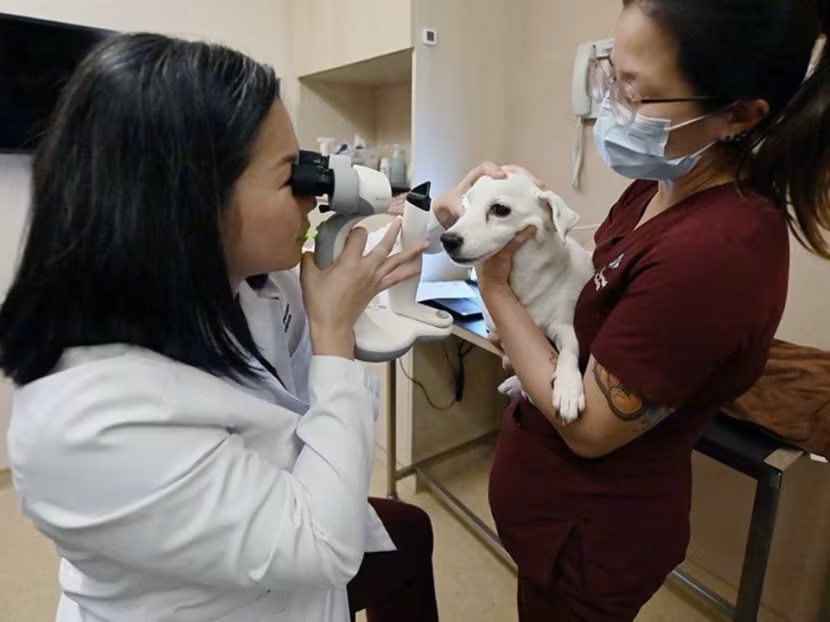
A pet ophthalmic examination is an assessment of your animal’s eye health, focusing on external and internal eye structures.
This evaluation is crucial for identifying any abnormalities, such as cataracts, glaucoma, or retinal disorders, that can impact the vision and eye health of your pets, such as dogs and cats. The exam helps assess vision clarity, pupil responses, tear production, and intraocular pressure.
Early detection of eye conditions through these examinations can help prevent vision loss and ensure timely treatment. Regular eye exams can help maintain long-term ocular health and enhance the quality of life for your pet.
Recognising signs of eye problems in your pet is crucial for maintaining their health and comfort.
Common symptoms include:
If you notice any of these symptoms, seeking early detection can help prevent the condition from worsening and protect your pet’s vision. Regular eye examinations are vital for your pet’s long-term eye health.
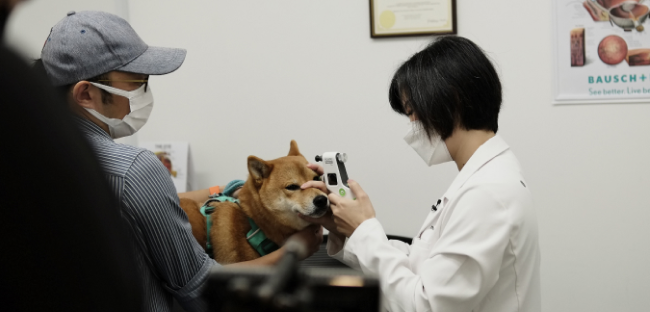
A pet ophthalmic examination involves a series of detailed tests to assess the overall health of your pet’s eyes and identify any potential issues. This process helps in the early detection of eye conditions, allowing for timely treatment.
Understanding your pet’s medical history during the examination helps identify potential hereditary eye conditions and assess overall health, which can influence eye health.
A thorough visual examination of the pet’s eye’s external structures, including the eyelids, conjunctiva, cornea, and sclera, helps identify abnormalities or signs of infection.
Assessing your pet’s vision and eye reflexes involves checking responses to light and movement, aiding in detecting visual impairments or neurological issues.
This examination measures intraocular pressure to detect glaucoma, an eye condition in pets that can lead to blindness if untreated.
During the exam, a dye is applied to the cornea of your pet’s eye to identify ulcers, scratches, or other corneal issues by highlighting damaged areas.
This examination measures tear production to diagnose conditions like dry eye, ensuring adequate lubrication of your pet’s eye.
Worried about your pet’s eye health? Schedule an eye examination today with Dr. Gladys Boo, the only American Board-Certified Veterinary Ophthalmologist in Singapore.
Dr. Gladys Boo offers eye exams for a diverse range of animals, including dogs, cats, horses, farm animals, and even zoo animals. Each species presents unique ocular conditions and requires tailored examination techniques. This requires tailored examination techniques, specific equipment, and right knowledge to diagnose and manage eye health for each animal type. Understanding these species-specific differences ensures the necessary care and better outcomes for pets, farm animals, and exotic species alike.
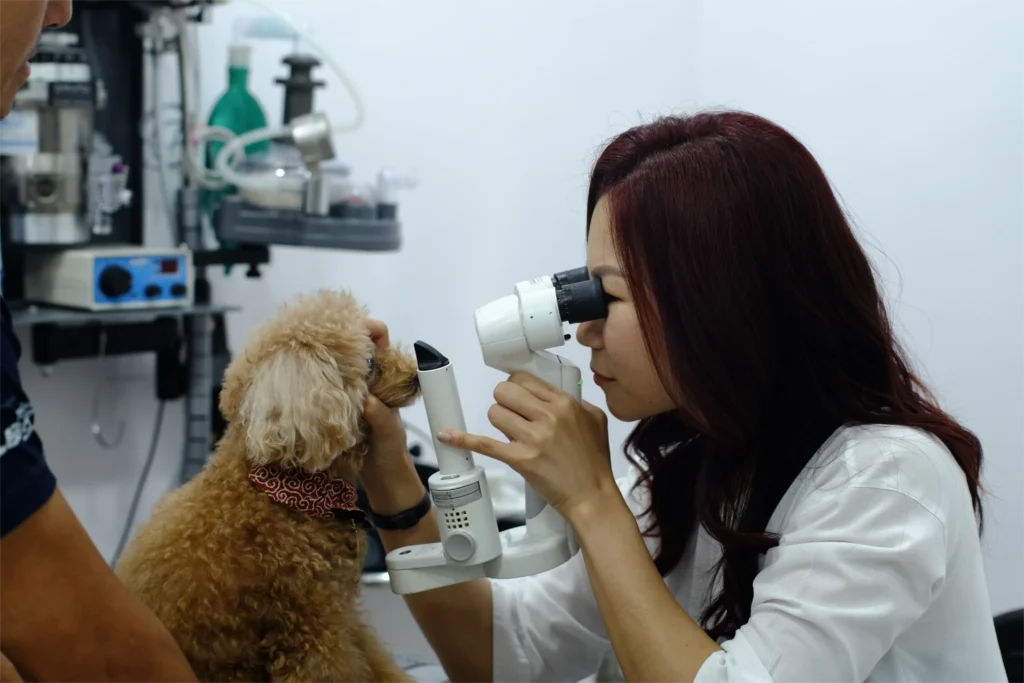
Common eye issues in dogs include cataracts, glaucoma, and retinal diseases. The examination process involves assessing visual acuity, checking for signs of ocular discomfort, and performing intraocular pressure measurements.
Gentle manual restraint is typically sufficient for most dogs during these procedures.
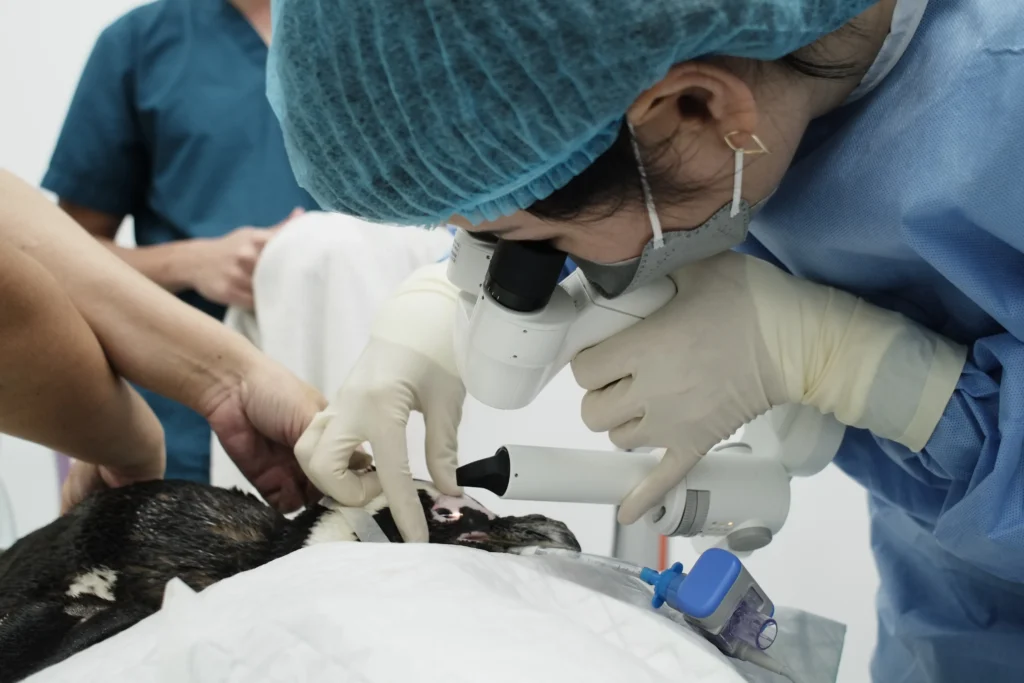
Cats often experience conditions such as corneal ulcers and uveitis.
Examinations focus on inspecting the cat’s eye’s cornea, assessing pupil responses, and evaluating tear production.
Due to their independent nature, cats may require additional restraint to ensure accurate assessment.
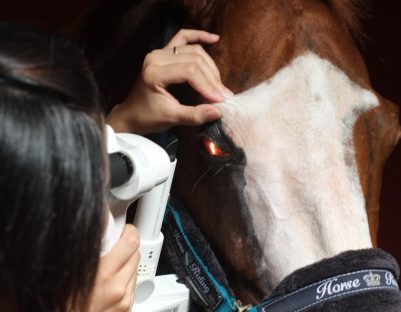
Horses are prone to eye conditions like corneal ulcers, uveitis, and cataracts.
The examination includes visual acuity tests, slit-lamp biomicroscopy, and intraocular pressure measurements.
Horses may require extra restraint techniques to safely conduct these procedures.

You may need to seek a veterinary ophthalmologist when a general veterinarian encounters complex eye conditions that require specific expertise. If your pet exhibits symptoms such as vision loss, eye discomfort, excessive discharge, or noticeable changes in eye appearance, it is crucial to consult an expert for examination and treatment.
Dr. Gladys Boo, Singapore’s only American Board-Certified Veterinary Ophthalmologist, helps manage different eye conditions. She offers eye examinations, diagnoses eye conditions and recommends care plans to preserve and improve your pet’s eye health. She is consulted by veterinarians for complex ocular cases to receive the required care for their pets.
It’s recommended to have an eye examination for your pet at least once a year for early detection of issues. Regular exams help maintain eye health and prevent the development of serious conditions in pets like dogs and cats.
If your pet is diagnosed with an eye condition, our ophthalmologist will recommend a care plan, which may include medications, pet cataract surgery, pet glaucoma surgery, or ongoing management as per the condition diagnosed to prevent complications and preserve vision.
A pet eye examination typically takes from 15-30 mins. After dilation, the veterinarian will assess various eye structures of the pet, including the retina, blood vessels, and optic nerve.
Most pet eye examinations can be performed without anaesthesia, using topical anesthetics for specific procedures like tonometry. However, in cases involving aggressive animals or requiring extensive procedures, sedation or general anesthesia may be necessary.
Routine veterinary check-ups involve a general health assessment, which includes a basic eye examination to check for obvious issues. However, a comprehensive ophthalmic exam performed by a veterinary ophthalmologist goes much further. It offers a thorough evaluation of your pet’s eye health, using tools and techniques to check both external and internal structures of the eye. An ophthalmic exam can identify subtle or early-stage eye conditions that may not be detected during a routine check-up, allowing for a better diagnosis and treatment.